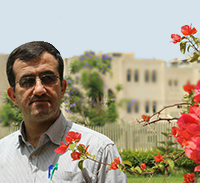Those, who do not make attempt, do not feel comfortable
Hamid Ghazvini
Translated by: Fazel Shirzad
2020-4-14
 ■The song of change and renewal of nature is heard from every direction, and spring presents its beauties.
■The song of change and renewal of nature is heard from every direction, and spring presents its beauties.
The air became Jesus, breath, and the dust, musk-diffusing
Green, the tree became; and into song the bird came[1]
(Hafez Shirazi)[2]
This spring, slowly and drunkenly, along with Eid al-Maba'ath[3] is celebrated, and it is a link between Iranian culture and prophetic tradition and bring a monotheistic worldview for all.
I'm happy in the world because the world is flourish from God
I love all the world because the world come from God[4]
(Saadi Shirazi)
Unfortunately, Iranian people, these days, have an uninvited stranger and gust, which has caused their suffering and sadness; it is an in interloper that sometimes results in death. This ominous gust tries to influence the spring and push away the happiness and flourishing. That is why, the first days of New Year have a different color and smell. On the one hand, pain, fever and shortness of breathiness, and on the other hand, sacrifice, resistance and service of members of the Health Front who have kept hope alive. This honor country has been repeatedly attacked by impostors and vulgarisms and enormous costs has been imposed to it , but Iran and Iranian people persist and continue to evolve. The life history of Iranian residents have shown that they were always defending themselves against any aggression targeted their nature and essence; thy used it as an opportunity to grow. That is why, I believe that Iran's cultural and civilizational background is a valuable asset to overcome this crisis.
For the next few weeks, the Corona virus will left here, and these hard times will be ended. On that day, another glorious page will be added to the Iranian life history. This time is an important experience in storing the knowledge of the people of this country.
Do not complain about the sadness in the way of desire
Those, don’t make attempt, don’t feel comfortable
(Hafez Shirazi)
[1]Original Translated by Wilberforce Clarke (1870-1905).
[2] He, known by his pen name Hafez and as "Hafiz", was a Persian poet who "lauded the joys of love and wine but also targeted religious hypocrisy".
[3] That is, Muhammad's revelation, an event described in Islam as taking place in 610 AD, during which the Islamic prophet, Muhammad was visited by the archangel Jibrīl, known as Gabriel in English, who revealed to him the beginnings of what would later become the Qur’an.
[4] This poem has been written by Saadi, also known as Saadi of Shiraz, was a major Persian poet and prose writer of the medieval period. He is recognized for the quality of his writings and for the depth of his social and moral thoughts
Number of Visits: 4179








The latest
- Third Regiment: Memoirs of an Iraqi Prisoner of War Doctor – 3
- 100 Questions/ 2
- Mohammad — The Messiah of Kurdistan
- The 371st Night of Memory – 3
- Third Regiment: Memoirs of an Iraqi Prisoner of War Doctor – 2
- 100 Questions/ 1
- Oral Narratives: An Open Window into Cultural Discourse
- Prerequisites and Methodology for Compiling Oral History
Most visited
- Prerequisites and Methodology for Compiling Oral History
- Oral Narratives: An Open Window into Cultural Discourse
- Third Regiment: Memoirs of an Iraqi Prisoner of War Doctor – 2
- 100 Questions/ 1
- The 371st Night of Memory – 3
- 100 Questions/ 2
- Mohammad — The Messiah of Kurdistan
- Third Regiment: Memoirs of an Iraqi Prisoner of War Doctor – 3
From Javanrud to Piranshahr
The Memoir of Reza MohammadiniaThe book From Javanrud to Piranshahr recounts the life and struggles of Commander Reza Mohammadinia, who spent part of the Iran–Iraq War in the western and northwestern regions of the country. During those years, he held responsibilities such as deputy commander of the Seventh Region of the Islamic Revolutionary Guard Corps (IRGC), acting head of the Javanrud district, service on the southern fronts, director of ...
Tactical and Strategic Analysis and Limitations
The present paper, entitled “A Critical and Scholarly Study of Dr. Hossein Alaei’s Two-Volume Book: Tactical and Strategic Analysis and Limitations”, is a research work that examines and evaluates the two-volume book “An Analytical History of the Iran-Iraq War”. In this study, the strengths and weaknesses of the work are analyzed from the perspectives of content critique, methodology, and sources.Clarifying the Current Situation; Perspectives of the Oral History Website
The definition of a “journalist” and the profession of “journalism” is not limited to simply “gathering,” “editing,” and “publishing breaking news.” Such an approach aligns more with the work done in news agencies and news websites. But now, after years of working in the field of books for various news agencies, newspapers, and magazines, when I look back, I realize that producing and compiling content for ...

